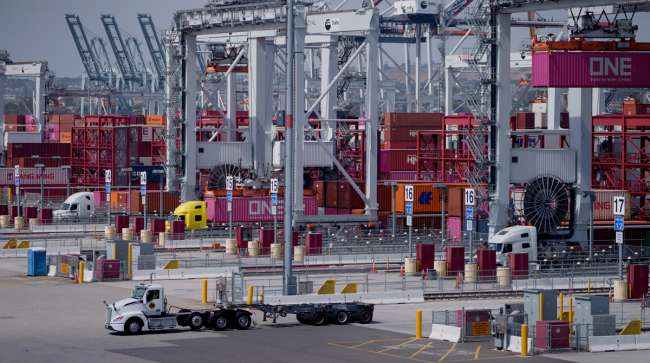Port Traffic Surging as Companies Rush to Beat Tariffs

[Stay on top of transportation news: Get TTNews in your inbox.]
The busiest maritime trade complex in the U.S. continued to move near-record levels of imports in October as businesses bring goods in ahead of potential tariff increases and seek to avoid labor-related disruptions at alternate ports.
Imports at the Port of Los Angeles last month totaled 462,740 20-foot-equivalent units, or TEUs. The port also handled 122,716 export containers and 319,570 empty containers in October, according to port data.
Next door, the Port of Long Beach moved nearly 1 million import, export and empty containers in October, beating a record set just two months ago.
This year, the ports of Los Angeles and Long Beach, which together account for roughly a third of all U.S. container imports, have seen their busiest ever peak season, which began earlier — and has lasted longer — than is typical.
Host Seth Clevenger and Features Coordinator Mike Senatore take you behind the scenes to unveil the 2024 Top 50 Global Freight Companies. Tune in above or by going to RoadSigns.ttnews.com.
The Southern California ports moved a combined 950,303 import containers in October, just shy of the 980,450 TEU record set in May 2021, when pandemic-era demand for consumer goods and supply chain snarls caused a massive backlog of ships offshore and a pileup of containers on the docks.
The people and companies that make up every link of the supply chain have spent the last two weeks since the U.S. election wondering whether President-elect Donald Trump will follow through fully on threats to hike levies on imports from China — and impose universal tariffs on goods from everywhere else. As a result, businesses are poised to continue bringing in larger volumes of goods through the end of the year, normally a quieter time for the ports.
In addition to getting ahead of tariffs, companies have diverted cargo to the West Coast to avoid potential further disruption at East and Gulf ports, where a dispute between dockworkers and their employers remains unresolved. A three-day strike by the International Longshoremen’s Association shut ports from Houston to Boston in early October, and another port strike could occur at East and Gulf ports early next year if they cannot reach a contract agreement with their employers, represented by the U.S. Maritime Alliance, before Jan. 15.
Want more news? Listen to today's daily briefing below or go here for more info:





